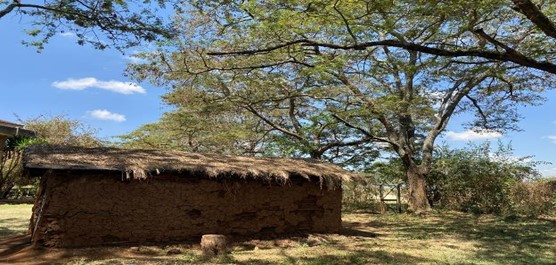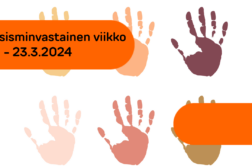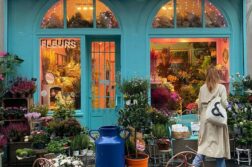It has been almost 2,5 years since the inception of student challenges for AgriSCALE project. The students were given the opportunity to apply their courses knowledge in addressing industry challenges and propose solutions. After all these times of cross learning and sharing, five students travelled for the last field work for HAMK between 7-21 October 2023 in Kenya for the Banana tissue culture challenge. This is the story of Oanh Luu Huynh Hoang, Climate Smart Agriculture student.
“We Are All Connected in the Great Circle of Life!”, Mufasa Lion King 1994
The Swahili phrase ”Hakuna Matata” spoken in several East African countries like Kenya and Tanzania was made popular from the movie “the lion king”. Here is my experience about my time in Kenya 2023 as the movie celebrates its 20th Anniversary.
Under this Erasmus + project and HAMK mentors, we had an opportunity to challenge ourselves through problem-based learning of tissue culture banana value chain in Kenya hosted by Jomo Kenyatta University of Agriculture of Technology (JKUAT). As a freshman in Climate Smart Agriculture in Häme University of Applied Sciences (HAMK), it helped improve my knowledge about tissue culture banana especially lab techniques from initiation to multiplication and then rooting.
What motivated you to participate in the student challenge?
“Passion is the bridge from pain to change”- Frida Kahlo. I have always put my heart and soul into agriculture. When I applied for the challenge, I wanted to verify for myself whether moving from footwear industry back to agriculture is just my rash decision or if my whole mind and body belongs to the agriculture field.
I worked in the footwear industry for over ten years after graduating with a Bachelor of Animal Science degree. Luckily, with the support received from HAMK, mentors and my team, I know that I am in the right place.
Our team interviewed lab technicians and observed their work in the commercial lab in the Institute for Biotechnology Research, Jomo Kenyatta University of Agriculture and Technology to find the reason(s) why there were significant losses of plantlets which has hindered achievement of targets.

Analysis of our interview revealed that, in some cases, what they explained was different from what we observed. There were obvious information gaps, missing or miscommunication between the manager and his team.
For instance, workers in the lab had less knowledge about banana varieties compared to the lab manager. Some workers were unable to identify/point out differences in the eleven banana varieties. To solve this problem in my opinion is easy. The manager could arrange weekly meetings to review the team’s performance.
Also, improving communication with his team by clearly speaking on processes and KPIs, challenges identified immediately, the end results will be better. In every group, teamwork and shared understanding plays a significant role in improving the success of that team.
In your opinion, how will this experience contribute to your ongoing studies and life goals?
Interviewing lab manager, his team and observing their daily routine helped me to improve my knowledge of tissue cultured banana from the development stage in lab to mass production in more detail.
Moreover, when our team interviewed the farmer, we found the current issues in agriculture not only in Kenya, but also in the whole world. Some of the issues we could not tackle due to the limited time of two weeks used in the field work.
These issues include ways to replace plastic with eco-friendly pots when transferring seeding from JKUAT to the farmers, how to get a balanced price among farmer, intermediary and market to ensure a win-win situation. I hope when I graduate from HAMK, I have enough wisdom to observe these pending issues outside the box and able to deal with them.
I was the lead for Orange Team so, I coordinated the teamwork through scheduling, listing next steps, and distributed the tasks among team members and had to step in to support team where there gaps. It helped me to upgrade my flexibility in work, problem solving and deepen my understanding of banana tissue culture lab techniques.
One challenge the team faced was the long list of interview questions which we could not handle individually, I divided my team into two small groups of three to do it. Team building and cross-cultural sharing in the beginning of the field work plus my experiences in footwear industry supported me to effectively interview the lab manager. He voluntarily provided his daily work statistics table which often seem to be confidential documents. Upon review of the documents, we found out that, information was missing for some months which means their management and supervision of lab work was not strict.
We strongly believe that after this trip, the manager and JKUAT would have more meetings about their internal management.
How does projects like these benefit HAMK students? In my opinion, HAMK Bio Africa projects brings 3 main benefits to HAMK students:
- As a student in Climate Smart Agriculture, these projects spread the importance of hands-on experience as well as academic training in our major.
- Different countries have different cultures, and we learnt some new techniques from Kenya. For example, people use plastic bag instead of glass lid to save money and reduce breakage in lab.
- Limited timeline is also a significant challenge for students. Fortunately, when people are in a high-pressure situation, it’s natural to speed up their thinking. My team and I never thought that we could closely observe and give constructive feedback as we did during the field work.

Bringing my story to an end, I will add that, I enjoyed the sight-seeing from Nairobi to Amboseli National Park. During the trip, I saw some people queued for fresh water from a tank showing some degree of water scarcity to the Kenyan population who relies on water source, not only for drinking but also for irrigation in agriculture and fishing.
In conversations with my Kenyan friend, she shared stories about Sky Water Technology, and we strongly believe that “We Are All Connected in the Great Circle of Life”. Following the natural process of atmospheric humidity, Sky water technology condenses by simulating the dew point to make water continuously even in low humidity conditions. Similarly, if humans can follow the natural process, one day at a time, farmer, intermediary and market will get a balance/Social, Environmental and Economic will also get a balance to become sustainable.
When people know how to protect Mother Earth, we will also be safe with her endless love.
Summarize your experience in three words.
Awe-inspiring and impressive.
Authors
Oanh Luu Huynh Hoang, Climate Smart Agriculture student
Jennifer Ohemeng, Project Specialist/ HAMKBio Research, HAMK in Africa




